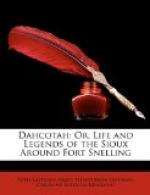The murderers were never found, and the hostages, after being detained for eighteen months at Fort Snelling, were released. They bore their confinement with admirable patience, the more so as they were punished for the fault of others. When they were released, they were furnished with guns and clothing. For fear they would be killed by the Dahcotahs, their release was kept a secret, and the Dahcotahs knew not that the two Chippeways were released, until they were far on their journey home. But one of them never saw his native village again. The long confinement had destroyed his health, and being feeble when he set out, he soon found himself unequal to the journey. He died a few days before the home was reached; and the welcome that his companion received was a sad one, for he brought the intelligence of the death of his comrade.
CHAPTER IV.
But we will do as the Dahcotahs did—turn from the sadness and horror of an Indian’s death, to the gayety and happiness of an Indian marriage. The Indians are philosophers, after all—they knew that they could not go after the Chippeways, so they made the best of it and smoked. Beloved Hail was dead, but they could not bring him to life, and they smoked again: besides, “Walking Wind” was to be married to “The War Club,” whereupon they smoked harder than ever.
There are two kinds of marriages among the Dahcotahs, buying a wife and stealing one. The latter answers to our runaway matches, and in some respects the former is the ditto of one conducted as it ought to be among ourselves. So after all, I suppose, Indian marriages are much like white people’s.
But among the Dahcotahs it is an understood thing that, when the young people run away, they are to be forgiven at any time they choose to return, if it should be the next day, or six months afterwards. This saves a world of trouble. It prevents the necessity of the father looking daggers at the son-in-law, and then loving him violently; the mother is spared the trial of telling her daughter that she forgives her though she has broken her heart; and, what is still better, there is not the slightest occasion whatever for the bride to say she is wretched, for having done what she certainly would do over again to-morrow, were it undone.
So that it is easy to understand why the Dahcotahs have the advantage of us in runaway matches, or as they say in “stealing a wife;” for it is the same thing, only more honestly stated.
When a young man is unable to purchase the girl he loves best, or if her parents are unwilling she should marry him, if he have gained the heart of the maiden he is safe. They appoint a time and place to meet; take whatever will be necessary for their journey; that is, the man takes his gun and powder and shot, and the girl her knife and wooden bowl to eat and drink out of; and these she intends to hide in her blanket. Sometimes they merely go to the next village to return the next day. But if they fancy a bridal tour, away they go several hundred miles with the grass for their pillow, the canopy of heaven for their curtains, and the bright stars to light and watch over them. When they return home, the bride goes at once to chopping wood, and the groom to smoking, without the least form or parade.




